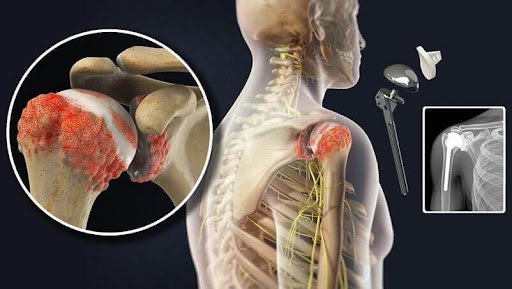Shoulder Replacement Surgery in Iran (Shoulder Arthroplasty in Iran)
Well-equipped hospitals, world-class experienced orthopedists and surgeons, and affordable and high-quality orthopedic surgeries in Iran attract foreign tourists to the country every year. In medical centers and specialized hospitals in different corners of the country, mainly in major cities like Tehran, Shiraz, and Mashad, you can see tourists of various nationalities who traveled to Iran to receive orthopedic services which are at the most decent prices compared to other countries. Shoulder Replacement Surgery in Iran (Shoulder Arthroplasty in Iran) is one of the most needed among orthopedic surgeries.
We at Iran Medical Tours will help you get your shoulder replacement in Iran at a high-quality and affordable cost. You can get in touch with us via WhatsApp, or the website.
Shoulder replacement removes damaged areas of bone and replaces them with parts made of metal and plastic (implants). This surgery is called shoulder arthroplasty (ARTH-row-plas-tee). The shoulder is a ball-and-socket joint. The round head (ball) of the upper arm bone fits into a shallow socket in the shoulder. Damage to the joint can cause pain, weakness, and stiffness.
Shoulder implants are available in a few different shapes and a range of sizes. Replacement options include partial and total using either anatomic or reverse implants. Shoulder replacement surgery is done to relieve pain and other symptoms that result from damage to the shoulder joint.
Conditions that can damage the joint include:
-
Osteoarthritis: Known as wear-and-tear arthritis, osteoarthritis damages the cartilage that covers the ends of bones and helps joints move smoothly.
-
Rotator cuff injuries: The rotator cuff is a group of muscles and tendons that surround the shoulder joint. Rotator cuff injuries sometimes can result in damage to cartilage and bone in the shoulder joint.
-
Fractures: Fractures of the upper end of the humerus may require replacement, either as a result of the injury or when the prior surgery for fracture fixation has failed.
-
Rheumatoid arthritis and other inflammatory disorders: Caused by an overactive immune system, the inflammation associated with rheumatoid arthritis can damage the cartilage and occasionally the underlying bone in the joint.
-
Osteonecrosis: Some types of shoulder conditions can affect blood flow to the humerus. When a bone is starved of blood, it can collapse.

